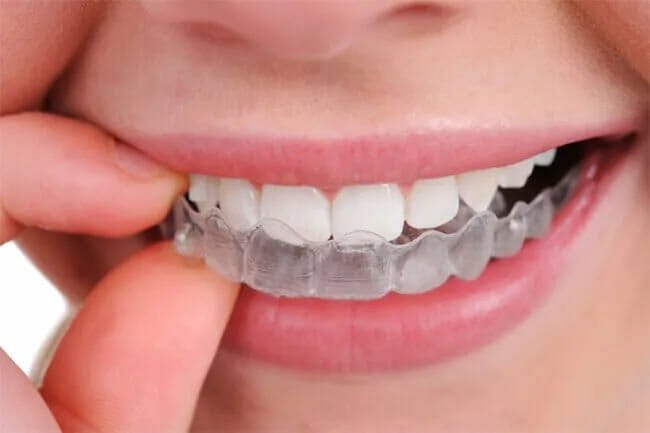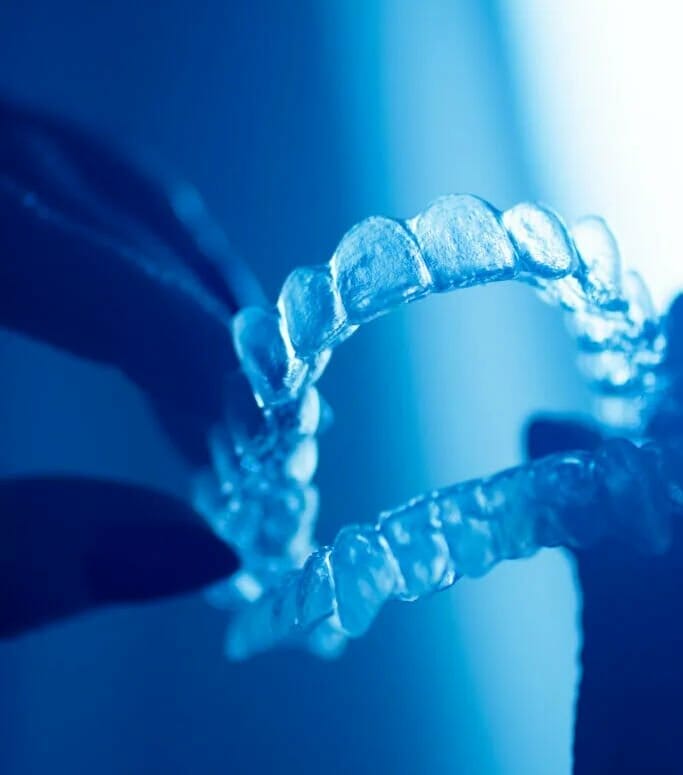Night Guards help to limit the damaging effects of tooth grinding. Tooth grinding or “bruxism” is common in adults and can have negative affects on you teeth, gums, facial muscles and jaw. The most common form of bruxism occurs when a patient clenches opposing teeth together and moves them laterally in this position under heavy load. Many patients are unaware that they clench and grind their teeth while unconscious during a night’s sleep. Luckily, there are numerous signs and changes which alert a dentist that a patient is grinding their teeth. These signs/changes include:

Book a consult to discuss Tooth Grinding and Nightguards with Dr. Kyle Hornby now. Please call us at (519)-576-8160 Or Schedule Your Appointment Online.
There are many theories on the cause of tooth grinding. The most common thoughts are that tooth grinding is related to stress. Patients often report more severe symptoms related to grinding (tension in facial muscles, jaw pain, achy teeth) during periods of high stress. Individuals with deadline-oriented careers (i.e. newspaper editors) tend to report grinding their teeth at a high frequency. Other theories suggest night time tooth grinding occurs during periods of interrupted or inadequate sleep. Night grinding appears to occur at a high frequency in individuals with sleep disorders and apnea.
Research suggests that obstructive sleep apnea is the most common risk factor for nighttime tooth grinding. Obstructive sleep apnea involves closure of the airway during sleep. Grinding may be the result of an “activation response” by your body to re-establish breathing after this closure. Other research suggests that tooth grinding may simply occur more frequently during the low quality, interrupted sleep that characterizes apnea.
Parents often ask me about noises they hear their kids making with their teeth. Tooth grinding is very common in toddlers and older children. Often children will show signs of wear or attrition on their teeth resulting from night time grinding. In most children, tooth wear does not cause any pain or sensitivity. Children almost never have jaw or muscle issues related to night time grinding. Luckily, their baby teeth will exfoliate between the ages of 6 and 12 so the wear on these teeth is not a cause for concern in most cases.
With the constant exfoliation of baby teeth and slow eruption of adult teeth through these year, there is too much ongoing change to be able to make a night guard that will fit for any prolonged period of time.
The muscle tension and pain associated with overuse during grinding can lead to headaches. Patients often visit our clinic reporting uncomfortable and unremitting tension headaches resulting from tooth grinding and clenching. What can help? These patients are often taking over-the-counter pain management medications but this solution is not sustainable long-term. Jaw soreness can be soothed with periodic cold compresses (i.e. with a bag of frozen peas or corn). If there is jaw stiffness, heat can help to increase the pliability and “stretch” of the jaw muscles. Patients can also benefit from giving their jaw and chewing muscles a bit of a vacation: transitioning to a softer diet and avoiding chewing gum for 1-2 weeks can help your jaw to have some “me time”. The most critical element of any solution to tooth grinding headaches is the use of a protective Night Guard.
When you wear a night guard, you still clench and grind your teeth. The appliance cannot stop you from clenching and grinding your teeth. What the Night Guard will do is protect your teeth and gums while reducing strain on your jaw during night time tooth grinding.
Night Guards do not help to limit snoring. Anti-snoring appliances are made of similar materials but their design is altogether different. Anti-snoring appliances are designed to push your lower jaw forward which opens your airway during sleep. Because a night guard does not advance your jaw forward, it has no effect on snoring.

A nightguard is a horseshoe-shaped piece of clear, hard acrylic that fits over your upper or lower arch of teeth. The nightguard provides a thick layer of acrylic between your teeth. Specifically, it protects opposing teeth from the wear and attrition that occurs when enamel surfaces are in contact during tooth grinding. The nightguard also provides a smooth surface on which your opposing teeth can glide around. This minimizes reactive forces around the jaw joint as you apply pressure while grinding. The smooth surface of the nightguard also minimizes engagement of facial muscles involved in chewing, providing relief from muscle tension and soreness.

Two short appointments are all it takes to have a night guard made. At appointment #1, we take dental impressions of your upper and lower teeth. The impressions are used by a dental laboratory in the fabrication of your Night Guard. Patients are typically booked 2 weeks later for the delivery appointment. During this appointment, Dr. Hornby will try in the Night Guard to ensure proper fit. He will also make sure that, when biting, your opposing teeth make balanced and even contact on the Night Guard. Night Guards should typically be heated in lukewarm water for 30 seconds prior to insert. Avoid using abrasive toothpaste to clean your Night Guard as it can prematurely wear down the acrylic surfaces.
You should bring your Night Guard to all cleaning and checkup appointments so that we can confirm continued proper performance of the appliance.
A well-made, custom, lab-fabricated Night Guard costs roughly $400. These are superior to cheaper store-bought night guards that can be acquired at your pharmacy. Typically, dental insurance plans cover custom-made Night Guards.
Schedule an Appointment Now
Service
Routine Dentistry & Tooth Repair
Oral Surgery & Tooth Removal
Prosthetic Dentistry & Tooth Replacement
Protective/Preventive Services
Teeth Whitening

OFFICE HOURS